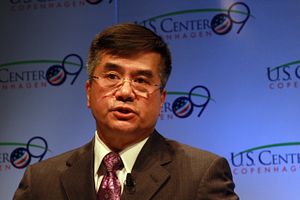U.S. Ambassador to China Gary Locke used his final speech in Beijing to urge human rights reform in China. Locke will leave Beijing on March 1, to be replaced by former Senator Max Baucus. Addressing human rights concerns just before leaving China has apparently become something of a tradition — previous ambassador Jon Huntsman incorporated a similar theme into his own farewell remarks.
In his speech, given to a group of Chinese university students, Locke once again expressed Washington’s concerns over a perceived crackdown on Chinese activists. According to the Voice of America, Locke said that “the U.S. is deeply concerned over the recent pattern of harassment, arrests, prosecutions of good government advocates, of public interest lawyers, of activists, Internet journalists, religious leaders, and even others in China.” He also suggested that improving human rights was crucial to China’s future, saying that China cannot reach its full potential without “reverence toward the rule of law” and “respect for the constitutionally guaranteed freedom of speech for all.”
Unsurprisingly, China rejected these criticisms. Foreign Ministry Spokesperson Hua Chunying told the press that is it an “objective fact” that China’s citizens enjoy “unprecedented rights and freedoms.” “We firmly oppose any person using these so-called issues to interfere in China’s internal affairs and make thoughtless remarks and criticize summarily on China’s internal issues,” Hua added.
Locke has served as ambassador since 2011, and during that time he has developed something of a reputation in China for being a human rights activist. Locke’s tenure will always be associated with the sensational story of Chen Guangcheng, the blind lawyer who escaped from house arrest in late April of 2012 and sought sanctuary within the U.S. Embassy. Though Locke himself was out of the country when the decision was made to admit Chen to the Embassy, many in the Chinese media held him solely accountable for the incident. An article in the Beijing Daily [Chinese] accused Locke of manufacturing crises (from the Chen Guangcheng incident to reporting Beijing’s PM 2.5 levels) to try to smear China.
The Chen Guangcheng case was particularly sensitive and provoked a rather extreme response, but a similar pattern applies to U.S.-China human rights spats in general. A U.S. official will express concern about human rights in China, and the Chinese government and/or media will respond by dismissing the complaint. The United States’ so-called ‘concern’ for human rights, China believes, is merely another tool to attack China and stall its rise to global prominence. Xinhua, citing a Chinese response to the 2012 U.S. human rights report, accused the U.S. of “pursuing hegemony under the pretext of human rights.”
Far from changing its ways in response to U.S. criticism, China believes it can bring the U.S. and other Western nations around to its way of thinking. Recent comments by Zhu Weiqun the chairman of the CPPCC’s ethnic and religious affairs committee showed China’s determination to convince the world of its perspective, rather than bowing to Western pressure on human rights. Zhu, as quoted by Reuters, argued that eventually Westerners “will have an understanding of Tibet and Xinjiang that better accords with reality,” meaning the West will come to accept China’s view on the separatist nature of the Dalai Lama and Uyghur activist groups. The growing prominence of such views, he said, is the “trend of history.” In the meantime, Zhu said, China “must totally disregard whatever the West says” with regards to human rights.
Given this attitude, what difference does it actually make to have U.S. officials like Gary Locke speak out about human rights? In a practical sense, not much. As Hillary Clinton put it in 2009, when U.S. officials bring up human rights issues to Chinese leaders, “we pretty much know what they’re going to say.” It’s a formality, in the same way that China’s protests over Obama’s meetings with the Dalai Lama and U.S. arms sales to Taiwan are a formality. No one in Washington thinks China will suddenly embrace the West’s definition of human rights, and no one in Beijing seriously thinks U.S. presidents will stop selling arms to Taiwan. The remarks are important in and of themselves, as a signal of official displeasure, not because they are expected to accomplish anything.
For example, the U.S. has a history of naming specific cases of interest in its comments about Chinese human rights. Nobel Peace Prize winner Liu Xiaobo, Chinese lawyers Gao Zhisheng and Chen Guangcheng, and now Chinese activist Xu Zhiyong have all been specifically named by U.S. officials calling for these men to be released. Yet despite repeated name-dropping by U.S. officials, three out of the four remain imprisoned. The only person to have gained his freedom was Chen Guangcheng — and his escape from house arrest can hardly be attributed to a policy change by China’s government.
Yet Chen’s example does raise an interesting point. He escaped with the bold plan of going to the U.S. Embassy to seek help. This suggests that U.S. comments on human rights do make a difference, by encouraging Chinese dissidents. Unfortunately, this is exactly what bothers China the most about remarks like those in Gary Locke’s final speech. The U.S. lending support, even intangible moral support, to Chinese dissidents feeds Beijing’s suspicion that Washington is secretly trying its hardest to foment revolution within China. The U.S. does cheer on activists in their attempts to reform China’s government, and to Beijing that is unacceptable. The Communist Party will never be able to shake the suspicion that the U.S. support also extends to actual revolution.
At heart, this issue is behind the distrust between the U.S. and China. Beyond the tensions arising from a rising power meeting an established one, U.S. and Chinese values and governing systems are so different that the two countries will never be able to entirely trust each other. The U.S. would be far more comfortable with a democratic China, and the Party knows it.

































